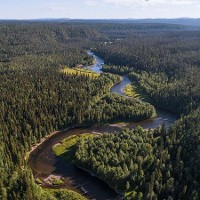IBFRA insight process
Introduction
The IBFRA insight process aims to strengthen cooperation between boreal countries. It will address climate change impacts, role of forests in mitigating climate change and the ways in which the forest sector can contribute to net negative emissions with the ambition to be an IPCC-like assessment of scientific consensus on selected topics.
Overview
The circumboreal forest is a vast region with considerable diversity in forest ecosystem types, drivers of carbon dynamics, vulnerability to climate change, and types and intensity of forest management. The impacts of global environmental changes are already affecting the boreal forest. At present, large scientific uncertainties remain about the magnitude and direction of the future contribution of boreal forests to the global greenhouse gas balance. This uncertainty has major policy implications for the level of mitigation efforts that will be required in other sectors, if future atmospheric CO2 concentration targets are to be achieved.
Many opportunities exist to enhance the contribution of the boreal forest to domestic greenhouse gas emission reduction targets, largely through enhancement of forest productivity and reducing natural disturbances, using wood products to store carbon, and by substituting harvested wood products for fossil-based products, steel and concrete to reduce emissions in other sectors. The most appropriate mitigation actions will depend on the current forest conditions, climate change impacts, and the socio-economic and institutional context for mitigation actions.
Therefore, mitigation strategies need to be regionally-differentiated portfolios of activities designed to meet carbon and other forest management objectives. Impacts of climate change on the forests need to be considered so that mitigation actions can be designed to also yield benefits for enhancement of forest resilience to climate change impacts and for other adaptation objectives.
The IBFRA insight process originates from the circumboreal ministerial meeting in June 2018 where the ministers adopted the Haparanda declaration with a view to strengthen cooperation between boreal countries. It will address climate change impacts, role of forests in mitigating climate change and the ways in which the forest sector can contribute to net negative emissions with the ambition to be an IPCC-like assessment of scientific consensus on selected topics.
The IBFRA insight process should be transparent and balanced and result in a scientifically-credible document, not to be a “promotional” or advocacy paper, but a scientific assessment of the potential of the boreal forest to contribute to climate change mitigation. The overall goal is thus to present a study endorsed by an international team of experts from six boreal countries, peer-reviewed, and based on science and analyses.
Partners
The Future Forests platform at the Swedish University of Agricultural Sciences will take the lead of this insight process. Together with a committee of members appointed by the board of IBFRA the Future Forest platform will share responsibility to find representative experts from the boreal countries and ensure transparency in the process. The Swedish Forest Agency and the Future Forest platform will finance the process within the framework of their missions from the Swedish government.

Timeframe
01.09.2018 - 01.12.2019
EVENTS
FAO-UNECE Forest Communicator’s Network – Annual Meeting
20 May 2019 - 22 May 2019
20 May 2019 - 21 May 2019
IBFRA18 - Cool Forests at risk?
17 Sep 2018 - 20 Sep 2018
More information
IBFRA Insight Process: Sustainable boreal forest management – challenges and opportunities for climate change mitigation
PUBLICATIONS


